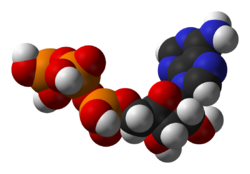Adenosine triphosphate

Adenosine triphosphate (ATP) is the molecule that supplies and stores energy needed for biochemical reactions in all cell processes. It is commonly referred to as the energy currency of cells.[1] The cell manufactures most of the ATP needed in the mitochondria, however some ATP is manufactured in a less efficient and, usually, smaller amount in the cytoplasm.[2]
Studies examining ATP production in ME/CFS cohorts have produced divergent conclusions. Several studies, such as Myhill, 2013, and Castro-Marrero, 2013, have found reduced concentrations of ATP in the blood of ME/CFS patients,[3][4] whereas others, such as Smits, 2011, and Vermeulen, 2010, have not detected any changes in ATP production.[5][6] A study by Lawson, 2016, showed an increase in ATP manufactured outside of the mitochondria.[7]
ATP synthase complex[edit | edit source]
The ATP synthase complex is also known as complex V.[8]
[edit | edit source]
- 2016, Elevated Energy Production in Chronic Fatigue Syndrome Patients
"Abstract: Chronic Fatigue Syndrome (CFS) is a debilitating disease characterized by physical and mental exhaustion. The underlying pathogenesis is unknown, but impairments in certain mitochondrial functions have been found in some CFS patients. To thoroughly reveal mitochondrial deficiencies in CFS patients, here we examine the key aspects of mitochondrial function in blood cells from a paired CFS patient-control series. Surprisingly, we discover that in patients the ATP levels are higher and mitochondrial cristae are more condensed compared to their paired controls, while the mitochondrial crista length, mitochondrial size, shape, density, membrane potential, and enzymatic activities of the complexes in the electron transport chain remain intact. We further show that the increased ATP largely comes from non-mitochondrial sources. Our results indicate that the fatigue symptom in this cohort of patients is unlikely caused by lack of ATP and severe mitochondrial malfunction. On the contrary, it might be linked to a pathological mechanism by which more ATP is produced by non-mitochondrial sources.[7]
- 2013, Targeting mitochondrial dysfunction in the treatment of Myalgic Encephalomyelitis/Chronic Fatigue Syndrome (ME/CFS) - a clinical audit.[3]
- 2010, Patients with chronic fatigue syndrome performed worse than controls in a controlled repeated exercise study despite a normal oxidative phosphorylation capacity.[6]
Video[edit | edit source]
Learn more[edit | edit source]
References[edit | edit source]
- ↑ http://www.biology-online.org/dictionary/Adenosine_triphosphate
- ↑ https://www.britannica.com/science/cell-biology/Regulation-of-RNA-after-synthesis#ref313768
- ↑ 3.0 3.1 Myhill, S.; Booth, N.E.; McLaren-Howard, J. (2013). "Targeting mitochondrial dysfunction in the treatment of Myalgic Encephalomyelitis/Chronic Fatigue Syndrome (ME/CFS) - a clinical audit" (PDF). International Journal of Clinical and Experimental Medicine. 6 (1): 1–15.
- ↑ Castro-Marrero, J.; Cordero, M.D.; Sáez-Francas, N.; Jimenez-Gutierrez, C.; Aguilar-Montilla, F.J.; Aliste, L.; Alegre-Martin, J. (2013), "Could mitochondrial dysfunction be a differentiating marker between chronic fatigue syndrome and fibromyalgia?", Antioxidants & Redox Signaling, 19 (15): 1855–1860, doi:10.1089/ars.2013.5346, PMID 23600892
- ↑ Smits, B; van den Heuvel, L; Knoop, H; Küsters, B; Janssen, A; Borm, G; Bleijenberg, G; Rodenburg, R; van Engelen, B (2011). "Mitochondrial enzymes discriminate between mitochondrial disorders and chronic fatigue syndrome". Mitochondrion: 735–738. doi:10.1016/j.mito.2011.05.005. PMID 21664495.
- ↑ 6.0 6.1 Vermeulen, R.C.; Kurk, R.M.; Visser, F.C.; Sluiter, W.; Scholte, H.R. (2010). "Patients with chronic fatigue syndrome performed worse than controls in a controlled repeated exercise study despite a normal oxidative phosphorylation capacity". Journal of Translational Medicine. 8 (93): 93. doi:10.1186/1479-5876-8-93. PMID 20937116.
- ↑ 7.0 7.1 Lawson, Nick; Hsieh, Chung-Han; March, Dana; Wang, Xinnan (2016), "Elevated Energy Production in Chronic Fatigue Syndrome Patients", Journal of Nature and Science, 2 (10)
- ↑ Koehler, Carla; Bauer, Matthias F. (May 13, 2004). Mitochondrial Function and Biogenesis. Springer Science & Business Media. p. 162. ISBN 978-3-540-21489-2.

